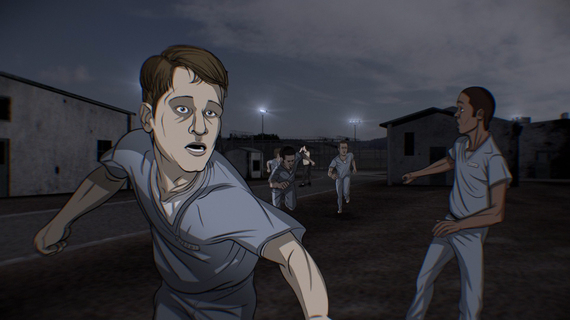Gabriel London is the director of the new documentary "The Mind of Mark DeFriest." It is the story of a man initially sent to prison for four years. He was later re-sentenced for a series of prison escapes remarkable in their frequency, audacity, and ingenuity. DeFriest now holds the record among those currently incarcerated for the most escapes, from spiking the prison staff's coffee with drugs to building keys out of paper.
DeFriest has now been incarcerated for 34 years, with 27 years in isolation.
I have known London since he was a teenager and admire his work enormously, so it was a special treat to get to talk to him about this film.
I was always interested in kids that were in kind of vulnerable situations. I found Mark's story in an article called Locked Alone in X Wing, about this draconian wing of the prison where prisoners were held 23 hours a day in solitary confinement above the electric chair, with double-doored, non-windowed cells and forbidden to have any books or magazines or TVs or radios. They mentioned Mark Defriest and I was intrigued by him because he was the only nonviolent offender on X wing and he was a notorious escape artist. The next day I was talking to this woman who had founded the organization Stop Prisoner Rape, and she kind of offhandedly said, "I have about 15 years of letters from a prison punk named Mark Defriest. If you are interested I'll send them to you." On one hand they have this prisoner who is a notorious escape artist at X wing and then on the other hand this guy has been writing these vulnerable letters about his identity and how he is losing himself after years of being a victim of prison rape in Florida prison.
It is a complicated story with many different elements. First is the question of whether DeFriest should have been sentenced to four years in prison in the first place. He was accused of stealing some tools belonging to his late father that he believed had been left to him, because his stepmother filed charges. In addition, the man who certified him as mentally competent to be prosecuted for criminal activity has now said he was wrong, and the documentary shows his efforts to undo the damage of his initial report. Third is the question of whether DeFriest's many escape efforts were criminal or just a response to the nightmarish conditions and continually extending terms of his incarceration.
London spoke about the challenge of presenting all of these factors and finding the right tone for a story that is profoundly tragic and wildly funny.
The great task on this film was essentially re-assembling a jigsaw puzzle that had never really been made complete. We had the mental illness side and the questions about whether Mark ever should have been put in prison in the first place. He has a great sense of humor and he had a completely tragic story. So how do we have a film that is both true to his sense of humor and makes you laugh at the same time you can really have a sense of the depths of sadness and sort of depravity that existed in the prison world that he came to know?
 London captured the tragicomic elements of the story with stark, graphic novel-style animation to recreate some of DeFriest's most outrageous escapes and with narration by actor Scoot McNairy ("Argo," "!2 Years a Slave"), based on DeFriest's letters and other statements.
London captured the tragicomic elements of the story with stark, graphic novel-style animation to recreate some of DeFriest's most outrageous escapes and with narration by actor Scoot McNairy ("Argo," "!2 Years a Slave"), based on DeFriest's letters and other statements.
As a result of the film, Florida's Commission on Offender Review voted to begin the process that may give DeFriest some hope for release. London is deeply appreciative.
It's pretty awesome. It's the power of story. When you use story to galvanize people, that is one of the greatest joys and privileges of making films. And at the same time it is not over yet and it is a delicate dance right now. Mark is not a free man. Progress is being made but I don't think I can really celebrate until I have the sense that he's safe. The prison world that he is in right now is anything but safe. And so the effort to tell his story and to bring more audiences into it is really just beginning.
It is also exciting to take a story like Mark's and leverage it to do good for people way beyond Mark. The goal is, "story equals power to change." That is something that I have had success with on other films, where a single story can become a driver for policy change. And what you are seeing now all over the country is people are rising up and saying that this prison system that we have built is broken and detrimental to the really healthy functioning of our democracy. So Mark's story is now being talked about, for example, in the Florida legislature, where there is an effort to reform the prison because of some major, major problems they are having with conditions of confinements but also inmate deaths.
I hope this where redemption is sort of possible for some of these folks, where you don't have to just lock people up and throw them away forever but have the ability to bring them back to society. Can you imagine what Mark's mechanical genius could have accomplished for society instead of figuring out how to make keys out of paper?
The audience for the film, London says, is "the jury Mark never had."
